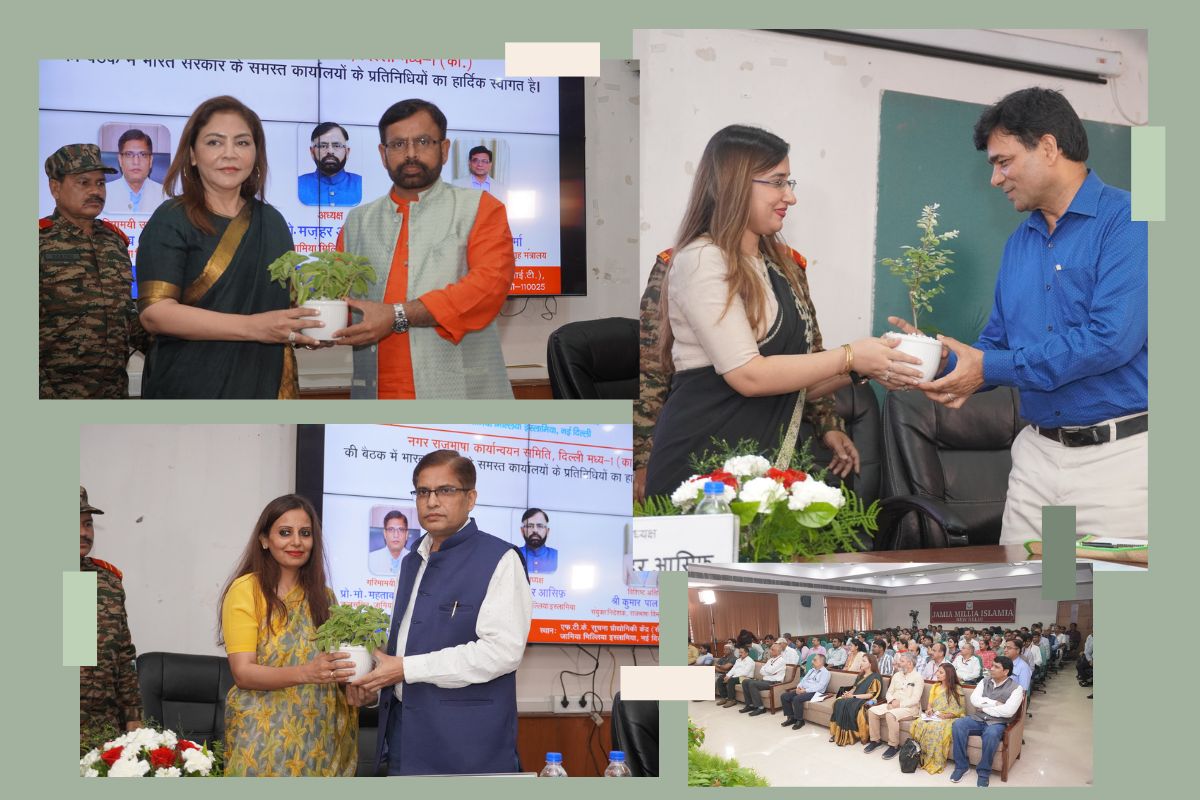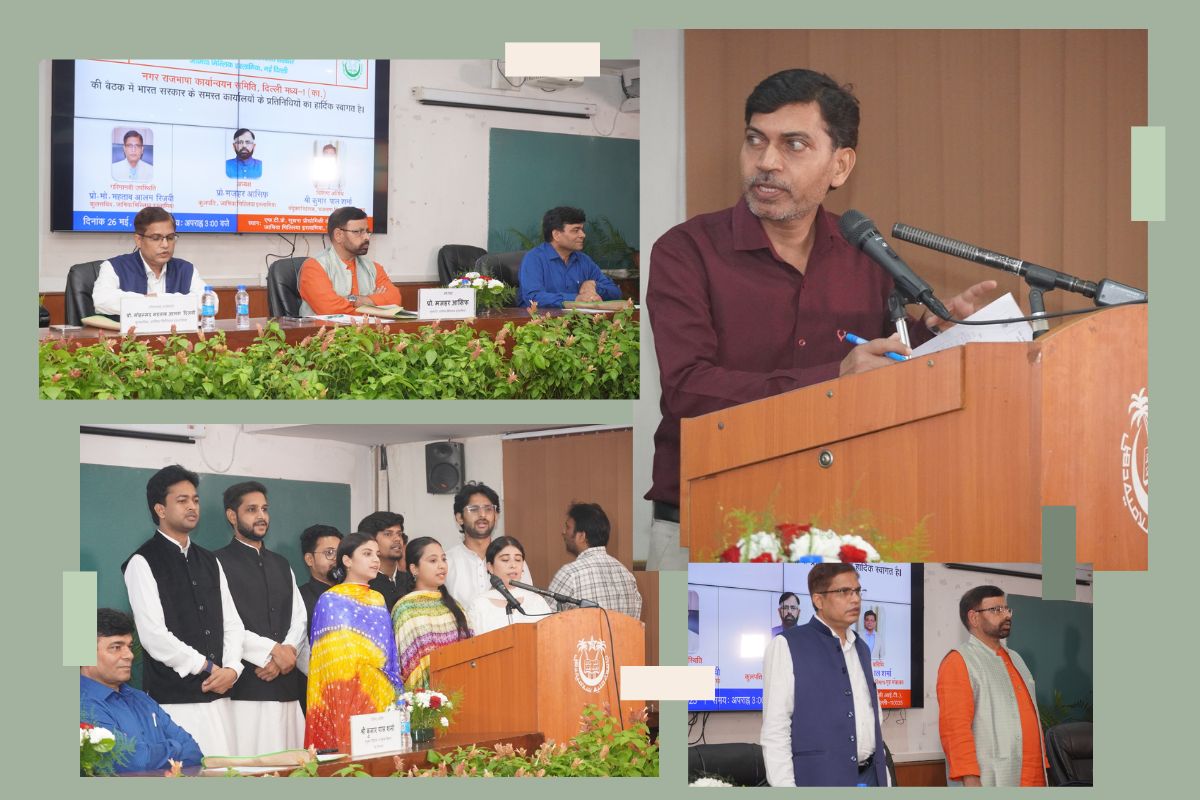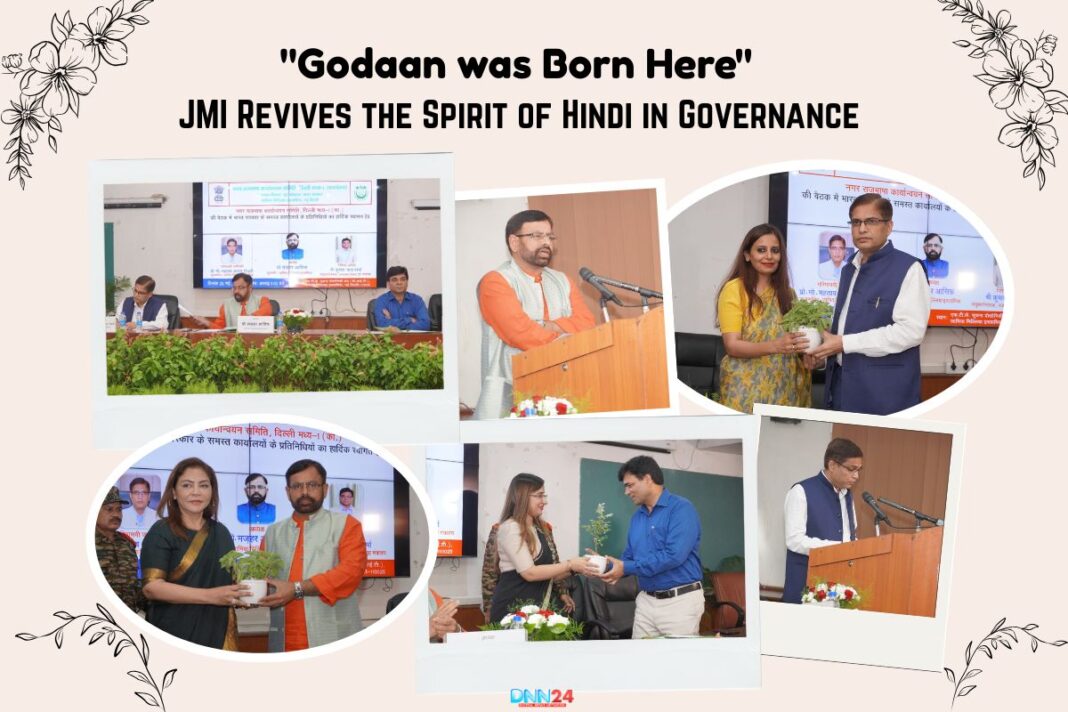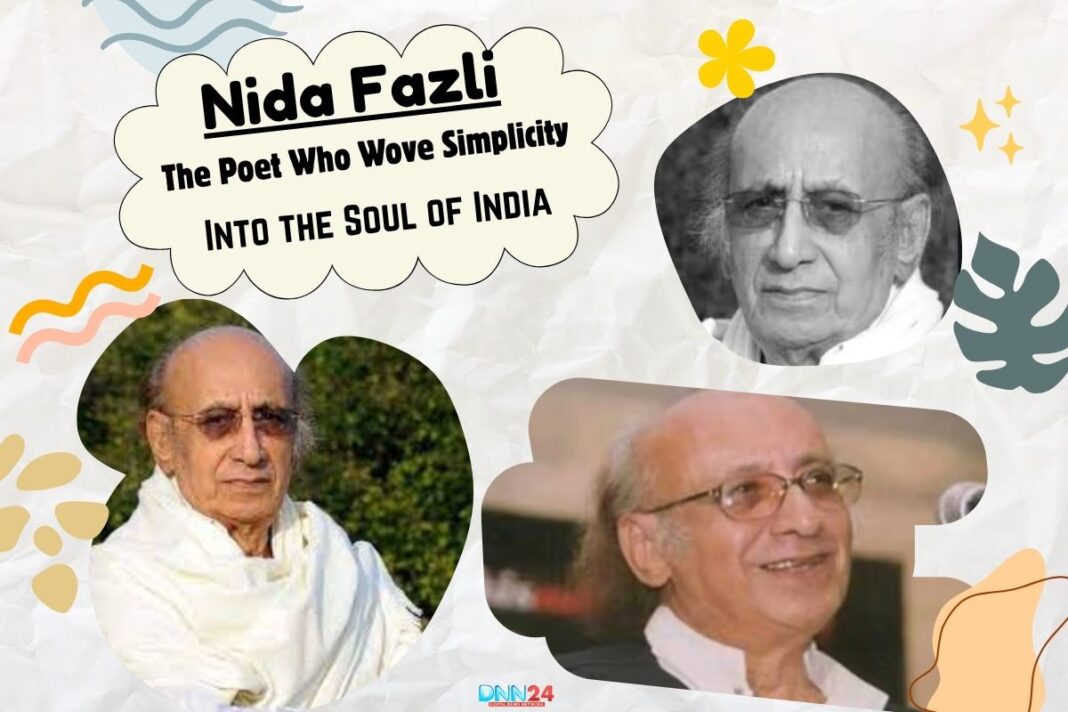On 26th May 2025, the historic campus of Jamia Millia Islamia (JMI) in New Delhi became the proud venue for the first meeting of the Municipal Official Language Implementation Committee (Nagar Rajbhasha Karyaanyayan Samiti), Delhi Central-1 (NARAKAS). The event was held under the leadership of the Vice Chancellor, Professor Mazhar Asif, who was recently entrusted with the chairmanship of this important committee by the Department of Official Language, Ministry of Home Affairs, Government of India.
The meeting saw the enthusiastic participation of heads and official language officers from 109 Central Government offices, marking a significant step towards promoting the use of Hindi in government work. The presence of dignitaries like Shri Kumar Pal Sharma, Joint Director, Department of Official Language, and other senior officials added gravity to the occasion. The program began with reciting a verse from the Holy Quran and the soulful Jamia Tarana, setting the tone for a day dedicated to the cause of Rajbhasha (official language).
The Registrar of JMI, Prof. Md. Mahtab Alam Rizvi, welcomed the guests and highlighted the deep connection between JMI and promoting Indian languages, especially Hindi, since its inception. He recalled how JMI was inspired by the freedom movement and the vision of great leaders like Mahatma Gandhi, Mohammad Ali Jauhar, and Hakim Ajmal Khan, who believed in preserving and promoting Indian languages. Prof. Rizvi pointed out that Mahatma Gandhi sent his son, Devdas Gandhi, to teach Hindi at Jamia, making the university’s commitment to Hindi historic.
The Importance of Rajbhasha: Official Language in Governance
The meeting focused on the crucial role of Hindi as the official language in government offices. Shri Kumar Pal Sharma addressed the gathering and shared his satisfaction that the responsibility of NARAKAS had been given to a historical institution like JMI. He explained that the committee’s work had slowed down in the past two years, but he was confident that JMI would now accelerate the implementation of Hindi in government functioning.
Shri Sharma discussed the legal aspects of the Official Language Act and the roadmap for achieving annual targets set by the Ministry of Home Affairs. He emphasized the need for all Central Government offices to issue documents in bilingual form, as required under Section 3(3) of the Official Language Act. Shri Sharma also clarified how different states and union territories are divided into ‘A’, ‘B’, and ‘C’ categories to smoothly implement the official language policy.
This division is meant to ensure that the targets for using Hindi are achieved according to the linguistic environment of each region. The officials and representatives from various offices shared the daily practical challenges in implementing Hindi. They requested the newly appointed President of NARAKAS, Prof. Asif, to help resolve these issues. Prof. Asif listened carefully to their concerns and assured everyone their problems would be addressed soon. The participants expressed their satisfaction with this assurance and pledged to work together to achieve the goals set by the committee.

JMI’s Legacy: Language, Culture, and National Identity
Professor Mazhar Asif spoke passionately about the deep relationship between language, culture, and national identity in his presidential address. He reminded everyone that the famous Hindi novel “Godaan” by Premchand was written on the very soil of Jamia, making the university a symbol of India’s literary and cultural heritage. Prof. Asif described Jamia as the realization of the dreams of Mahatma Gandhi and Rabindranath Tagore, who believed in the mother tongue’s power to shape a nation’s soul.
He explained that mother, motherland, and mother tongue are inseparable, just like a child cannot be separated from his mother. Prof. Asif also referred to the National Education Policy (NEP) 2020, in which he played a key role as a Draft and Implementation Committee member. He highlighted that NEP 2020 gives special importance to the mother tongue in education and administration, reflecting the vision of India’s founders.
Prof. Asif’s words inspired the audience to see the promotion of Hindi not just as a government policy but as a mission to strengthen India’s unity in diversity. He thanked the Department of Official Language, the committee members, and all the distinguished guests for their support and cooperation. Prof. Asif expressed hope that everyone would work together and be dedicated to taking the message of Rajbhasha to every corner of the country.

Moving Forward: Committees, Collaboration, and Commitment
The JMI administration has taken concrete steps to ensure the effective implementation of the official language policy. Several sub-committees have been formed, with coordinators from departments such as Examinations, Students’ Welfare, Public Relations, Library, Hindi and Persian Departments, Environmental Studies, and more. These sub-committees will work together to promote using Hindi in all university and government administration aspects.
The program was smoothly conducted by Assistant Registrar Ms Shruti and Hindi Officer Dr Rajesh Kumar, ensuring that every part of the event reflected the spirit of collaboration and commitment. The meeting concluded with a heartfelt vote of thanks by Professor Pawan Kumar Sharma, Controller of Examinations, followed by the singing of the National Anthem. This event at Jamia Millia Islamia marks a new beginning in promoting Hindi as the official language in government work.
It reminds us that language is not just a tool for communication but a bridge that connects people to their roots, culture, and nation. By reviving the spirit of “Godaan” and the dreams of India’s great leaders, JMI is again leading the way in making Hindi a living, vibrant part of India’s governance and public life. The university’s commitment to mother, motherland, and language is a shining example for all institutions nationwide.
Also Read: Pad Squad: Spreading Menstrual Dignity Across India’s Communities
You can connect with DNN24 on Facebook, Twitter, and Instagram and subscribe to our YouTube channel.



